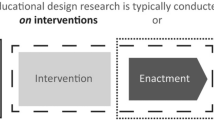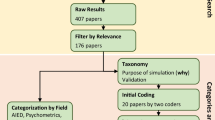Abstract
In his thought-provoking review of current trends in educational research, Winn offers advice to practitioners and to researchers concerning the role of computer-based simulations in education (Winn, W. (2000). Educ. Psychol. Rev. 14, 331–351). In this critique, I offer two proposals for consideration by those who wish to make practical recommendations about learning environments: (1) Recommendations for practice should be based on specifically relevant evidence. (2) The available methods for collecting evidence should not exclude controlled experiments; instead, researchers should be free to choose among experimental or observational methods, use quantitative or qualitative measures, focus on artificial or naturalistic settings, and invent new techniques as needed. In short, I join the call for evidence-based practice and issue-driven research.
Similar content being viewed by others
References
Cuban, L. (1986). Teachers, and Machines: The Classroom Use of Technology Since 1920, Teachers College Press, New York.
Cuban, L. (2001). Oversold, and Underused: Computers in the Classroom, Harvard University Press, Cambridge, MA.
Lagemann, E. C. (2000). An Elusive Science: The Troubling History of Educational Research, University of Chicago Press, Chicago.
Levin, J. R., and O'Donnell, A. (1999). What to do about educational research's credibility gaps? Issues Educ. 5: 177–239.
Mayer, R. E. (1999). To foster meaningful learning: Is science still relevant? Issues Educ. 5: 255–260.
Mayer, R. E., Duran, R., Quilici, J., Moreno, R., Woodbridge, S., Simon, R., Sanchez, D., and Lavezzo, A. (1997). Cognitive consequences of participation in a Fifth Dimension after-school computer club. J. Educ. Comput. Res. 16: 353–369.
Mayer, R. E., Quilici, J. H., and Moreno, R. (1999). What is learned in an after-school computer club? J. Educ. Comput. Res. 18: 223–235.
Moreno, R., and Mayer, R. E. (1999). Multimedia-supported metaphors for meaning making in mathematics. Cogn. Instr. 17: 215–248.
Moreno, R., Mayer, R. E., Spires, H., and Lester, J. (2001). The case for social agency in computer-based teaching: Do students learn more deeply when they interact with animated pedagogical agents? Cogn. Instr. 19: 177–214.
Phillips, D. C., and Burbules, N. C. (2000). Postpositivism and Educational Research, Rowman and Littlefield, Lanham, MD.
Shavelson, R. J., and Towne, L. (2002). Scientific Research in Education, National Academy Press, Washington, DC.
Slavin, R. E. (2002). Evidence-based education policies: Transforming educational practice, and research. Educ. Res. 31: 15–21.
White, B. Y. (1984). Designing computer activities to help physics students understand Newton's laws of motion. Cogn. Instr. 1: 69–108.
White, B. Y. (1993). ThinkerTools: Causal models, conceptual change, and science education. Cogn. Instr. 10: 1–100.
White, B. Y., and Frederiksen, J. R. (1998). Inquiry, modeling, and metacognition: Making science accessible to all students. Cogn. Instr. 16: 3–118.
Winn, W. (2002). Current trends in educational technology research: The study of learning environments. Educ. Psychol. Rev. 14: 331–351.
Author information
Authors and Affiliations
Corresponding author
Rights and permissions
About this article
Cite this article
Mayer, R.E. Learning Environments: The Case for Evidence-Based Practice and Issue-Driven Research. Educational Psychology Review 15, 359–366 (2003). https://doi.org/10.1023/A:1026179332694
Issue Date:
DOI: https://doi.org/10.1023/A:1026179332694




